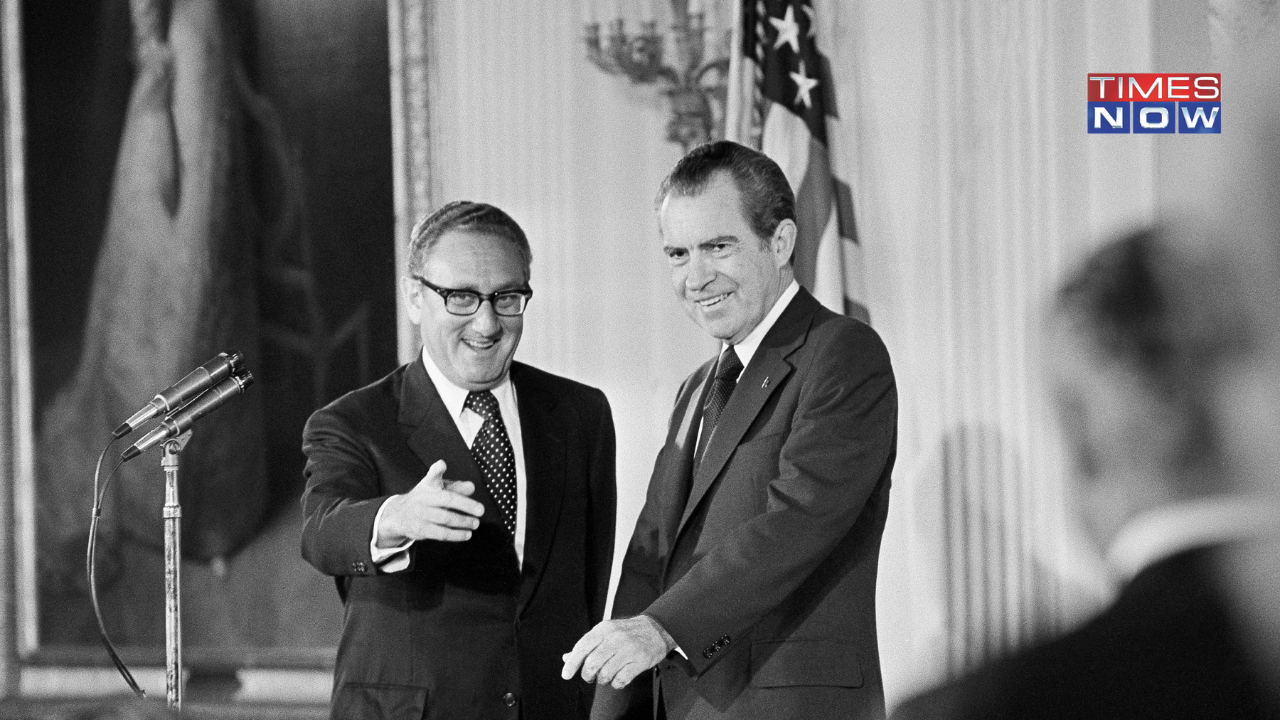Henry Kissinger Controversies: Nobel Peace Prize 'Fiasco' to Backing Pakistan's 'Genocide' in Bangladesh
Throughout his tenure as a public servant and diplomat, Henry Kissinger was known was his practice of "realpolitik" - which refers to 'engaging with the world based on practical objectives rather than moral ideals.' However, his 'practical objectives' often landed Kissinger in trouble to the extent that the US diplomat was called a "war criminal".

Henry Kissinger Controversies: Nobel Peace Prize 'Fiasco' to Backing Pakistan's 'Genocide' in Bangladesh
Photo : AP
Washington DC: Henry Kissinger, former US Secretary of State, died on November 29 at the age of 100. Amid all the praises for the former US diplomat, a series of controversies linked to Kissinger have also emerged. From his Nobel Peace Prize Fiasco to his backing of Pakistan's genocide in Bangladesh, here are some of the controversial moments of the most influential US diplomat.
Kissinger served as US Secretary of State and National Security Advisor under former Presidents Richard Nixon and Gerald Ford. During both the presidencies, Kissinger was a prominent voice of foreign policy and the US's role across the world.
Throughout his tenure as a public servant and diplomat, Henry Kissinger was known was his practice of "realpolitik" - which refers to 'engaging with the world based on practical objectives rather than moral ideals.'
However, his 'practical objectives' often landed Kissinger in trouble to the extent that the US diplomat was called a "war criminal".
Henry Kissinger Controversies Listed
The Nobel Peace Prize 'Fiasco'
Henry Kissinger and Vietnam's Le Duc Tho are still known as the most controversial Peace Prize winners. The duo was awarded for their work to impose a ceasefire in Vietnam. The Paris Peace Accords were signed in 1973, for which Kissinger and Tho were hailed. However, two years later, their work came undone with the fall of Saigon.
After Kissinger and Tho were awarded the prestigious award, two out of five members of the Nobel Prize committee submitted their resignation due to the "bad decision". Following the outbreak of the Vietnam War, the US diplomat tried to return his Peace Prize, however, the committee declined his request.
US' Carpet Bombing Of Cambodia
At the same time of the Nobel Peace Prize, Kissinger had been accused of allowing the Vietnam War to spill over to Cambodia. When the US decided to bomb Cambodia, Kissinger was serving as NSA.
Anthony Bourdain, an American chef and author, has been a vocal critic of Kissinger. In his 2001 book, Bourdain wrote - "Once you’ve been to Cambodia, you’ll never stop wanting to beat Henry Kissinger to death with your bare hands".
The U.S. carpet-bombing Cambodia during the Vietnam War killed thousands of civilians and helped enable the rise of the genocidal Khmer Rouge regime.
South American War Crimes
In 1976, the right-wing military leaders seized power in Argentina. Following their takeover, Kissinger told them, "If there are things that have to be done, you should do them quickly," after which, rampant human rights abuses took place in the country. Tens of thousands of people "disappeared", and were tortured and assassinated.
In Chile, Kissinger was vocal in his support for Augusto Pinochet's coup in Chile against elected President Salvador Allende. After the election of the Marxist leader, the CIA carried out covert operations in Chile to help opposition groups overthrow the new government and Kissinger was the head of this committee.
Backing Pakistan During the Indo-Pakistan War of 1971
Declassified documents from the US State Department reveal the pivotal role Kissinger played in the Indo-Pakistan War of 1971. The documents revealed that the US had been directly supporting Pakistan and avoiding a direct confrontation with India. The Indo-Pak 1971 war ended with the creation of Bangladesh as an independent country as opposed to east Pakistan.
Henry Kissinger’s funeral will be a closed-door, private event. The 100-year-old US diplomat is survived by his wife Nancy Maginnes Kissinger, two children by his first marriage, David and Elizabeth, and five grandchildren.
End of Article
Subscribe to our daily Newsletter!
Videos





03:53
Urfi Javed Flaunts her Topless Style | Jennifer Mistry's HEARTWARIMNG note for TMKOC

04:45
'World Used Kashmir Against India': What EAM Said On J&K's Art 370| Page From Times Now Archive

02:59
Breaking News: SC Upholds Abrogation Of Article 370 | No Special Status For J&K | Latest Updates

04:35
NC, PDP, And BJP Reacts On Abrogation Of Article 370 | Will Centre Be Vindicated? | Latest News

02:42
Israel Hamas War | Netanyahu Says 'Hamas Is Surrendering' | What's Happening In Gaza? | World News














